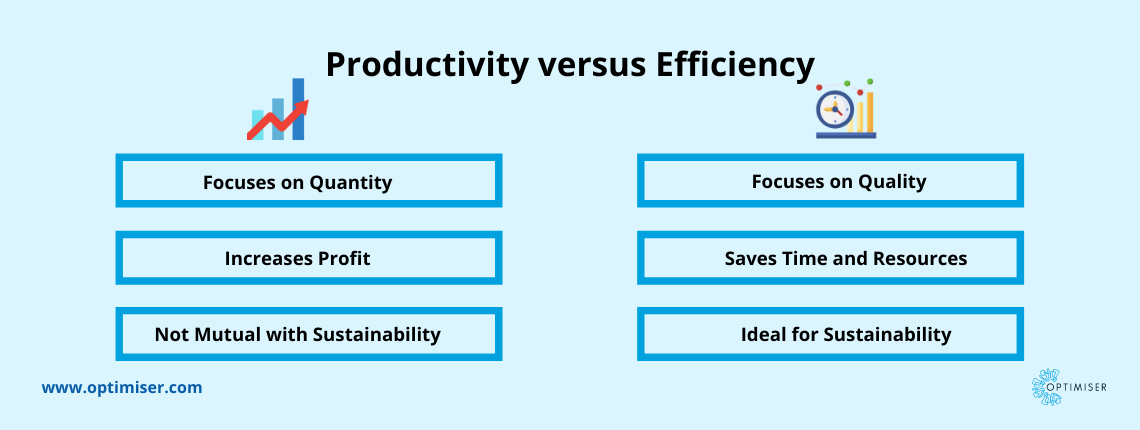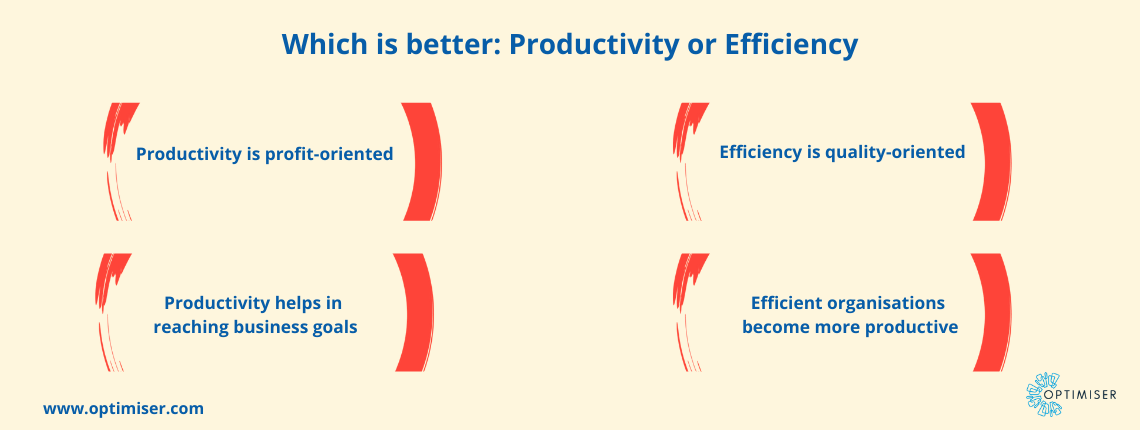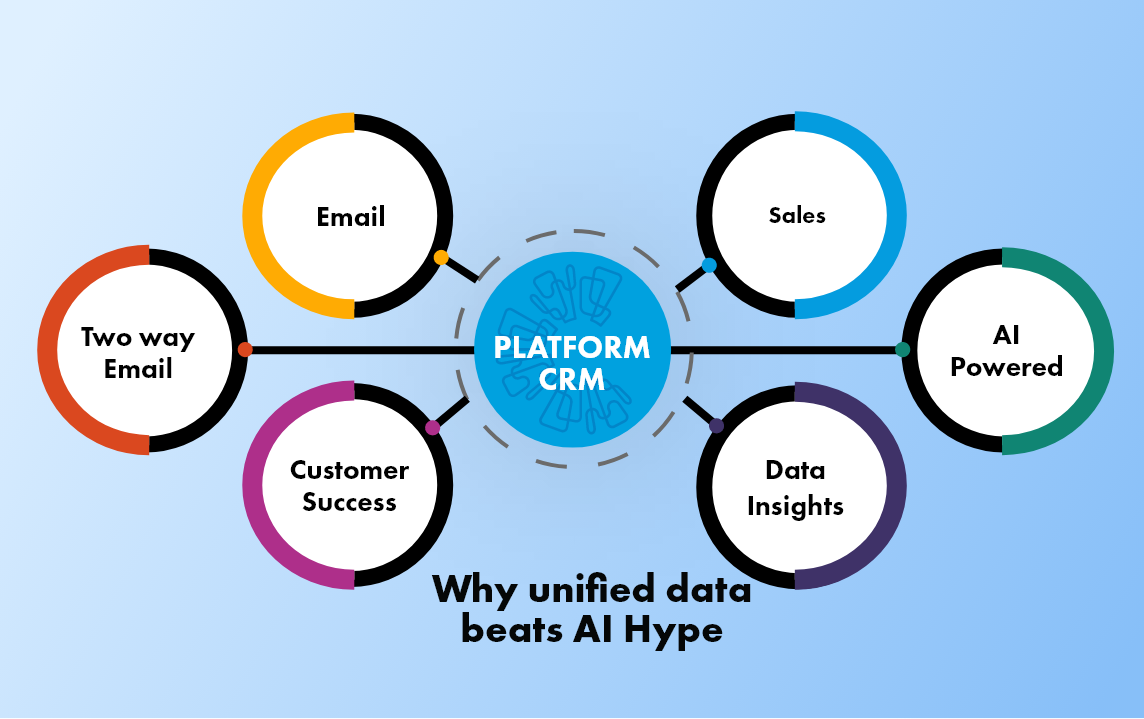.png)
Productivity v/s Efficiency: Who wins over the other?
An average employee is productive for 2 hours and 53 minutes per day. And the engaged employee can improve the profit margin by 21%. However, pushing productivity can be detrimental for the employees as 41% of them have stated that it negatively impacts them and the output.
However, efficiency focuses on doing less work that is of better quality in the same amount of time. So, what should be the centre of attention?
What is Productivity?
In Economics, Productivity is the measurement of output per unit of input. At a corporate level, productivity is the efficiency measure of a company's production process.
In a workplace setting, productivity in the workplace is the amount of work being accomplished within a specific time. Depending on the nature of work, the organisation measures the output. Taking the example of the sales department, it can refer to customers acquired, sales gained, and phone calls made within one month.
Benefits of Productivity
Attaining a higher level of productivity is one of the top objectives of every business. Higher productivity leads to less cost of production, higher levels of productions and effective utilisation of the existing resources. As a result, the concept is gaining the attention of producers, consumers, and employers.
Since it increases profits, productivity can be useful when installing the latest technology and improving the enterprise. It ensures the greater social and economic development of a business' economy.
What is Efficiency?
The term efficiency means a peak level of performance that utilises the least amount of inputs and the achievement of the highest amount of output. It reduces the number of unnecessary resources used to produce a given product. The resources also include both personal time and energy.
Efficiency is a measurable concept. Determined using the ratio of useful output to total input minimises the waste of resources. It is important for smaller businesses as inputs are scarce. Raw materials, money and time, are limited and conserving them is very important.
Benefits of Efficiency
An efficient business will be able to serve its customers effectively and conduct business operations smoothly. Efficient goods are sold at a lower price and bring in more customers. It improves the quality of customers' lives, given they are being provided with an effective product at a budgeted rate. In fact, it has been observed that efficiency improves productivity in a shorter amount of time.

Measuring Productivity and Efficiency
How to measure productivity?
Let us assume that a business is generating £100,000 worth of goods per week for a second. This output is achieved by using 1,000 labour hours, that is, the input. So to calculate the company's productivity, you can divide 100,000 by 1,000, equivalent to 100. This implies that for every hour of work put in, your organisation marked £100.
How to measure efficiency?
Consider two designers, Designer A and Designer B. Designer A creates 10 pieces per week. In contrast, Designer B produces only 5 per week. While A appears to be far more productive, what would make A efficient if the designed pieces matched the theme selected. Meaning, Designer B is more efficient than A as they create pieces that are far more relevant to the selected theme. While A is working productively and creating more pieces, B is working consciously on creating pieces that can be presented to the clients immediately without requiring extra work.
Productivity Vs. Efficiency
Overall workplace performance can be improved if the employees focus more on being productive. However, efficiency can ensure that the products are produced with the least effort and saving resources.
For example, A content writer can produce 13 articles per week productively. However, another content writer can efficiently produce 10 articles that are proofread and edited in a week. The difference being, while the comparison between the numbers makes the former more advantageous. The latter is accomplishing writing, proofreading as well as editing.
This points towards the old debate: Quantity versus Quality.
Productivity focuses on the quantity of the work done, whereas efficiency focuses on the quality. Continuing with the example of the content writers, Writer A is dishing out 13 articles. In contrast, Writer B is doing 10 articles that are proofread and edited and can be published immediately. Writer A will require time to proofread and edit their article to make the final publication which implies that it requires an additional resource, that is, time. In addition, they will need time to review any error and correct it.
Many organisations focus on productivity more because it is easy to calculate. The numbers are easy to navigate around. Efficiency requires extra attention as it focuses on the best possible output for every unit of time. Productivity focuses on calculating the amount of work done in a specific period.

The Big Reveal: Which is better?
As remarked before, greater Efficiency can improve productivity.
Having a productive mindset will allow you to reach your business goals. It fosters an environment of accountability within the organisation. While one cannot shortchange one over the other, it has been observed that Efficiency is the better area to focus on as it covers similar grounds as productivity.
To simplify crunching the numbers, companies can employ CRM solutions like Optimiser to calculate both productivity and Efficiency. Given that Optimiser is an all-rounder CRM with third-party integrations and AI-enabled automation, it is scalable and flexible. Under a single platform, your data will be stored. You will have an aerial view of your business operations using the dashboard functions.
Effective for both productivity and efficiency, Optimiser CRM streamlines your workflow operations. With its single platform simplicity, this 100 percent customisable CRM is easy to use and enhances the user experience. Workflow automation cuts down the tedious tasks. In minimal time you can process raw data for detailed analytics. And using these insights, create project strategies for efficient work processes and track the progress. Without additional costs, Optimiser's robust automation connects with the customers and assists the employees.

30 days free trial. No credit card required
 One powerful platform
One powerful platform
 Simple to use
Simple to use
 Comprehensive
Comprehensive



